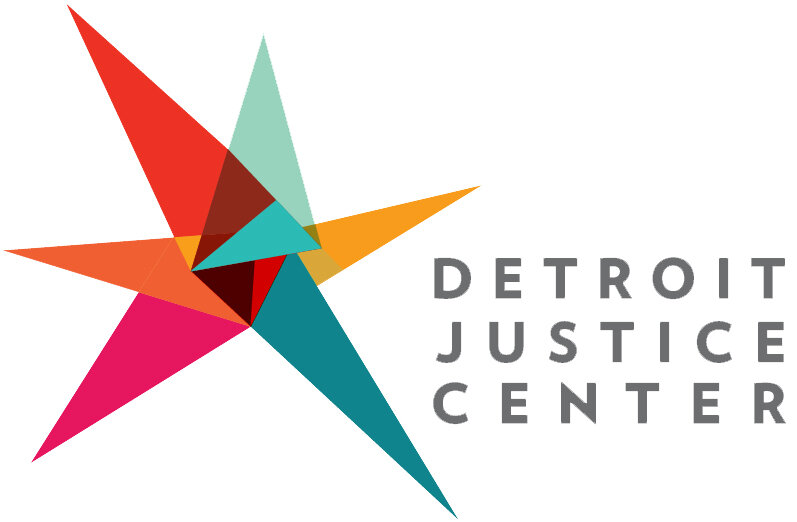Statement on the MI Jails Task Force Bills
For the past 18 months, the Detroit Justice Center has been working alongside our many partners to shape change through the Michigan Joint Task Force on Jails and Pre-trial Incarceration and the subsequent bills that have been passed in the Michigan Senate. Our Founding Executive Director, Amanda Alexander, was appointed to the task force by Governor Whitmer as an expert in pretrial services. As part of the task force, Amanda was instrumental in making sure that the group of legislators and stakeholders on the task force met with currently incarcerated people. Our role throughout this process has been one where we have insisted that those directly impacted by the criminal legal system play a part in the creation of the task force’s recommendations. We were also thrilled to see so many Detroiters with incarcerated loved ones, formerly incarcerated people, and advocates show up to the task force’s meetings in Detroit. The written and public testimony provided by these individuals, including stories shared by members of our own Detroit Justice Center team, had a significant impact on the recommendations the task force put forward. We see these bills as a step on a path towards undoing the immeasurable harms of the criminal legal system and will continue to fight for an overhaul of these systems. We want to thank those of you who spoke out at all of the task force meetings, and hope that you will share in celebrating the passage of these bills with us.
Among the highlights of this bill package are an end to driver’s license suspensions, except in cases where the underlying violation is “operating while intoxicated, reckless driving, or any driving violation that causes injury, death or serious impairment to another person.” The relief this will provide to Michiganders cannot be overstated. The bill’s passage is immediate and retroactive, meaning that currently suspended licenses will be reinstated and the practice of suspending people’s licenses simply because they cannot afford to pay the fines and fees associated with suspension will come to an end. Many traffic misdemeanors will also now be civil infractions, meaning that people cannot face jail time for the offense, and the fines and fees associated with them will be lower. These are both huge steps in the right direction, as are the bills that make it more likely officers will use citations instead of arrests, that reduce mandatory minimum sentences for some offenses and make probation a bit less onerous. We’re also heartened by the potential passage of SB 1047 which will make it easier for people to clear warrants on non-assaultive offenses, and, if certain amendments are adopted, put an end to the practice of issuing bench warrants in “failure to appear” situations where the purpose of the hearing is to discuss money owed. DJC Staff Attorney Erin Keith explained, “For too long, Michiganders have faced situations where they were given two options: pay money they don’t have or be arrested. This will hopefully begin to remedy some of the harm caused by these situations.”
While there are many highlights in this bill package, the bills still leave much to be addressed in order to truly eradicate the racial bias in policing and courts as well as the criminalization of poverty. For example, while some offenses have been decriminalized, they are still considered civil infractions, and though this may lessen the amount of fines and fees, there are still situations where people’s wages would potentially be garnished for non-payment. Ultimately, these bills don’t go far enough to address “crimes of poverty” like trespassing, which are often used to criminalize transient people. We are also concerned that driving without insurance is still a misdemeanor offense instead of a civil infraction. “This impacts far too many people,” said DJC attorney Geoff Leonard, “particularly in the city of Detroit where car insurance rates continue to be the highest in the nation.” The bills also lack requirements for individualized determinations of a particular person’s indigence and a requirement that fines/fees are proportional to a person’s income. This could, again, lead to people owing money they cannot reasonably afford to pay, although the consequences for failing to pay will now be less severe. “Additionally,” said DJC managing attorney, Nicole Huddleston, “these bills do not remove the general incentive that cities and courts have to generate revenue through fining non-residents, people of color, and the poor, because it leaves in place courts’ ability to charge exorbitant court costs, and does nothing to change the court funding structure that requires cities to fund their own courts.” Furthermore, the bills do not directly address racial bias in policing and prosecution. We have made a series of recommendations for more deep-seated change in our 2020 report, Highway Robbery and we will continue advocating for relief for the clients we serve.
While we celebrate the immense burden these changes in the law will lift off our clients’ shoulders, we remain gravely concerned that courts will find new ways to charge clients with misdemeanors or other civil infractions to bolster operating funds. Nothing in the bills removes the incentive courts have to generate revenue off of non-residents, people of color, and the poor, although it makes it slightly harder for them to do so. We applaud the efforts of the task force and the legislators who have worked zealously to make our criminal legal system less unjust and a little more conscious of the challenges faced by so many. We look forward to seeing how the implementation of this legislation will benefit our client base and are committed to continuing the fight alongside our movement partners for more widespread change.


